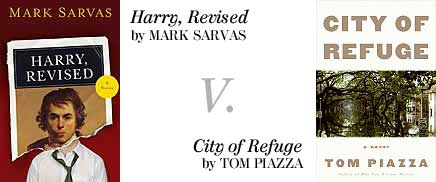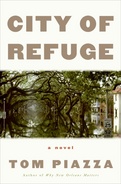
- This is Round 2, Match 2
- March 20, 2009
- Next Match
- Previous Match
The Tournament of Books is an annual battle royale between 16 of the best novels published in the previous year.
A new match is played here each weekday in March.
All titles 30% off at Powells.com
The Rooster on Facebook, and on Twitter
Previous years: 2008, 2007, 2006, 2005
Contact the Tournament staff:
talk@themorningnews.org

judged by David Rees
MY THERAPIST: Come on in, David. How was your week?
ME: It was alright. I have to review this book. (Waves around a copy of Harry, Revised.)
MY THERAPIST: Let’s see. Harry, Revised. That looks like a nice book.
ME: Uh-huh. That comma doesn’t bother you?
MY THERAPIST: What comma?
ME: The comma in the title: Harry, COMMA, Revised.
MY THERAPIST: Why would I be bothered by a comma?
ME: You don’t think it represents everything that’s corrupt and debased and fake about our entire culture?
MY THERAPIST: Umm, no.
ME: I have to tell the truth in here, right? Well, I can’t let go of that comma. It just feels so pretentious: Harry, COMMA, Revised. It’s like, “Ooh, a li’l punctuation-mark flourish to make everything more perfectly middle-brow and NPR-ly. Ooh, everybody look at the comma,” you know?
MY THERAPIST (leaning back in her chair in that way she does): Maybe this isn’t about the comma.
ME: We’re all doomed. Our culture is dying. THE END.
MY THERAPIST (writing something in her little pad, probably about “catastrophic thinking”): If the author had named the book Henry Revised, with no comma, would that make it better for you?
ME: Harry Revised. I don’t know; yes. Yes. No. Because, for me? The comma symbolizes what I don’t trust about this book. The whole thing is just so relentlessly, mercilessly tasteful and well-spoken and intelligent—
MY THERAPIST: My God, you make it sound just horrible.
ME: No, I know, but see, when I say the book’s “intelligent,” it’s not the kind of intelligence that challenges you, or makes you fall in love with English in a new way, or teaches you something crazy about people, or anything like that. This book is intelligent, like: “Ah, how nice it is to be a literary novel! Would anyone like to read a tastefully chosen word in the context of this boring-ass paragraph about how some guy’s sad that his wife died?”
MY THERAPIST: I’m sorry David, whose wife died?
ME: In the book. The hero, or anti-hero, or whoever, Harry Rent, his wife dies and he’s all discombobulated, and he gets a crush on this random waitress at a coffee shop and decides to win her heart by secretly improving the life of her fat, working-class co-worker, and everything spirals out of control, and gets all wacky, and then at some point Harry comes to a realization about his marriage, and his dead wife’s sister falls asleep on his shoulder, and then I finished the book and closed the cover and was filled with deep and abiding rage.
MY THERAPIST: “Deep and abiding rage.” Hmm.
ME: I know I sound like a total maniac.
MY THERAPIST: Nobody said you sound like anything.
(Silence)
Let’s explore that “deep and abiding rage.”
(Silence)
How’s your book proposal coming, David? Have you been able to motivate yourself to work on it?
(Silence. Deep and abiding silence.)
ME: No—you know what? I can make this case. This doesn’t have to be about me and what a failure I am and how I wish God would just freakin’ drop a finished-ass book in my hands and let me sell it and then go on Terry Gross and make a million bucks with the movie option. I know it seems like this is all about me and my emotions—especially since I just knocked over your water pitcher—but really, it’s about the book. This book. For instance, it’s about one dude’s grief, and how it compels him to undertake this crazy project with this random waitress, and every page is filled with descriptions of emotions—emotions, emotions, emotions, he’s having so many emotions, each one is articulated and described by the author and pinned to the butterfly board or whatever, and eventually you want shake the author and say, “Get out of the way of your characters and their emotions and let them breathe for a minute and let me come to my own conclusions about their emotions!” Which is too bad, because there actually is an interesting issue at the heart of the book. About resentment and class. But I wanted to yank that issue out of this novel and let it live on its own. And after all those pages of emotions, I gotta say, the strongest emotion I had about Harry, Revised was a mild annoyance at the people who blurbed it—at the whole blurbo-industrial complex, really.
MY THERAPIST: Why bother with the blu—
ME: Listen to this blurb: “Rich with earned emotion.” See, that sounds great—in that weird, book-jacket-y way—but it’s exactly wrong, because this novel is such a hermetically sealed celebration of its own novelishness, the reader never has to stretch or risk or earn anything.
MY THERAPIST: I’m not sure criticizing this book’s blurbs is the best use of your energy.
ME: I know. Blurbs are blurbs. I guess I never got lost in this book, so that just left my own stupid mind for me to get lost in. And you know how that goes.
MY THERAPIST: Yes. Yes I do.
MY THERAPIST: Come in, David. How was your week? “Read any good books lately?”
ME: Actually? Yeah. Here. You should read this. It’s pretty awesome.
MY THERAPIST: City of Refuge. Looks like a nice book.
ME: Yeah. It’s about Hurricane Katrina.
MY THERAPIST: Oh my.
ME: I started reading this book and I was like, “Grown-up time. Real-novel alert.” I swear, this novel feels like it’s breathing and stretching and moving like a big organism dedicated to teaching you some really real shit about life.
MY THERAPIST: Good. This is good, David. I’m glad you liked the—
ME: Dr. B., do you have any idea how fucked up Hurricane Katrina was? I mean, I followed it on the news, and blamed Bush like everyone else, but good God. Reading this book you realize: What a mess. What a mess. Death. Just: Death. Chaos. There’s a scene where the main character is in his house during the storm and wakes up to this big booming sound and then he realizes what’s happened before you do—the levees have broken—and then what? Oh, right, of course, his home is filling with water. Deadly, deadly water. Here: “As long as the house doesn’t go, he kept thinking; as long as the house doesn’t go.” And that’s that.
MY THERAPIST: I wonder if it helped you put some of your own issues in perspective?
ME: You could say that. Parts of this book are so scary, it’s like a wet version of The Road, except with more punctuation marks and less Bibledy-speak. And the dialogue feels spoken instead of typed, and there’s lots of cool details, and great flashes of inelegant authorial rage—some serious earned emotion—and even though the author seems more charmed by his male characters than his female characters, and even though I wish there had been more about the Superdome, still… goddamn.
MY THERAPIST: So you don’t think this book takes itself too seriously?
ME: Well, it’s a serious book, definitely, but it doesn’t spend time admiring itself. It feels exactly as poetic, or literary, or whatever, as it should be—like, a couple steps down from Richard Price. No flash. Because the story is what’s driving the writing—and real, researched life is what’s driving the story. It felt very real, but it also felt very strange, like I was reading history about a parallel world I had only seen shadows of. But it was America, of course.
(Silence.)
You know what?
(Turning the book over.)
I’m gonna quote one of the blurbs: “There are books that give back to art and there are books that give back to life—this book is among the latter.” Yes.
MY THERAPIST: It sounds like this book took you out of your head and into the world. That’s a blessing.
ME: Yes. Yes. It is.
Today’s WINNER
City of Refuge by Tom Piazza

About the Judge
From the Booth
| I don’t think any of us so far have given Sarvas enough credit. | Kevin | John | Despite some qualms about how Mark’s vision turned out, I was rooting for the underdog to come out on top. |
» Read Kevin Guilfoile & John Warner’s commentary on the match and leave a comment of your own «
The Standings
View the Brackets [PDF]
• Finals •
City of Refuge3 v. A Mercy1
judged by all judges + Amanda Hesser
• Round 1 •
26661 v. Steer Toward Rock4
judged by Brockman
Netherland2 v. A Partisan’s Daughter3
judged by Kate Schlegel
The White Tiger1 v. Harry, Revised4
judged by Jonah Lehrer
Unaccustomed Earth2 v. City of Refuge3
judged by Mary Roach
Shadow Country1 v. The Disreputable History of Frankie Landau-Banks4
judged by Anthony Doerr
The Lazarus Project2 v. The Northern Clemency3
judged by Monica Ali
A Mercy1 v. The Dart League King4
judged by Jonathan Eig
Home2 v. My Revolutions3
judged by Witold Riedel
• Round 2 •
26661 v. A Partisan’s Daughter3
judged by Maud Newton
Harry, Revised4 v. City of Refuge3
judged by David Rees
Shadow Country1 v. The Lazarus Project2
judged by C. Max Magee
A Mercy1 v. My Revolutions3
judged by John Hodgman
• Semifinals •
26661 v. City of Refuge3
judged by Liz Entman
Shadow Country1 v. A Mercy1
judged by Junot Díaz
• Zombie Round •
City of Refuge3 v. The Disreputable History of Frankie Landau-Banks4
judged by Rosecrans Baldwin

